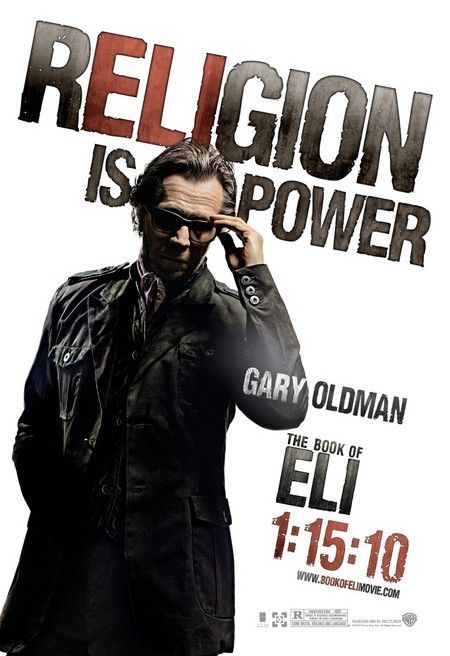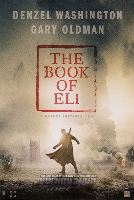 Films like The Day After Tomorrow, 28 Days Later, 2012 and Zombie Land all have one thing in common --mankind fighting to survive as the world unravels. Whether the plot focuses on love, science or humor, something always seems to help mankind pull through. Having these films fairly fresh on my brain I really did not expect The Book of Eli to be exceptional in the least. I was particularly suspicious of the Scriptural overtones. I had no desire to watch a big budget film centered on mass destruction and the twisting of Scriptures. I was worried it would be too depressing to recover from. As the buzz continued to stir among my friends, though, I gave in. I must say, I think this film is special.
Films like The Day After Tomorrow, 28 Days Later, 2012 and Zombie Land all have one thing in common --mankind fighting to survive as the world unravels. Whether the plot focuses on love, science or humor, something always seems to help mankind pull through. Having these films fairly fresh on my brain I really did not expect The Book of Eli to be exceptional in the least. I was particularly suspicious of the Scriptural overtones. I had no desire to watch a big budget film centered on mass destruction and the twisting of Scriptures. I was worried it would be too depressing to recover from. As the buzz continued to stir among my friends, though, I gave in. I must say, I think this film is special.
Don't get me wrong. iI you typically enjoy action-packed, apocalyptic films - you need not fear. The Book of Eli has everything you have come to expect. It's got the war-torn landscape, the cannibalism, the violence, the looting, the rape, and, yes, it's got the guns. It has all the filth that we are willing to admit would take center stage in our world if anarchy prevailed. I warn you, though, if you allow your lust for big Hollywood action to check your intellect and your heart at the opening credits, you will certainly lose some very precious pearls in the swine-filled cesspool that unfolds on the big screen. This film has some things to say.
It is set in a world barely recognizable as our own. The landscape has been obliterated by human warfare. The cause: the Christian Bible. Subsequently, all the copies have been destroyed. All but one. Enter Eli (Denzel Washington). Eli is a solemn man appointed by God to take the surviving copy of the Christian Bible out west. Eli knows very little about the intricacies or the purpose of this journey, but he has experienced enough of God's righteousness to know that God's purposes are worthy of his participation. What started as a small voice in his head that led him to discover the Bible, has turned into a powerful and loving presence that he is privileged to obey. This God is so real to him that he has been prayerfully and carefully carrying out this task for t hirty years without wavering.
hirty years without wavering.
Carnegie (Gary Oldman) is our antagonist. He has visions of building an empire. We first come upon him reading a book about Mussolini. Carnegie has commissioned a gang of vile men to search for the surviving copy of the bible. Though it is a bit foggy exactly what his plan is, it is clear that he is not interested in the God that the Bible speaks of; rather, he is interested in using the book to manipulate and control the masses. He believes this sacred book has power in and of itself. The tension between these two men as they seek to accomplish their respective tasks most certainly drives the film. And, it makes one thing glaringly clear: God is the author of this story.
So, Is This the End?
What kind of story is God writing? Is this the end of all things or the beginning? It does not seem to be about the end. Much is left open as to how the world has been destroyed, but it seems to have been something more than simply war. People in the film talk about a hole opening up and a great 'flash' of light falling through it. It was this light, or this fire, that destroyed most of the world. We seem to be in the midst of a Noah-esque story. God has looked down on man and is so disturbed he is moved to action. He decides to start over. A cosmic etch a sketch shake, so to say. Just as he touchingly remembered Noah, here he remembers Eli. Eli is playing the role of Israel post-fall. God is building a dynamic relationship with Eli that reveals his character and defines his judgment as necessary, loving and life-giving. It is not an apocalypse at all, it is a creation narrative of sorts. God is faithfully continuing to redeem his creation from within.
Judgment and Mercy
The name Eli comes from the book of Samuel and his story affirms the theme I have suggested. Eli was Israel's high priest at the cusp of two eras. The endless cycle of sin and punishment wrought on the unfaithfulness of the judges of Israel on the one hand and the ushering in of the Hebrew kings on the other. The second era ultimately led to the building of the temple and to God's desire to live in that temple among his people. It is a story of God's judgment moving toward loving intimacy.
 This is the story we watch. And, if you let it, it will help you to view the stories of the Old Testament in a new light. In our sensitive humanist society, we find it hard to deal with the God of the Old Testament with his penchant for violent judgments. In the world depicted by the Book of Eli, we see that this judgment is necessary in moving the world forward to restoration and intimacy with God. Martin Luther King said, "Justice is really just love in calculation." And that truth is blazingly illuminated in this film.
This is the story we watch. And, if you let it, it will help you to view the stories of the Old Testament in a new light. In our sensitive humanist society, we find it hard to deal with the God of the Old Testament with his penchant for violent judgments. In the world depicted by the Book of Eli, we see that this judgment is necessary in moving the world forward to restoration and intimacy with God. Martin Luther King said, "Justice is really just love in calculation." And that truth is blazingly illuminated in this film.
God has brought judgment on a completely wicked world and he is right to do so. But as we watch Eli carry out his task, we see God's loving purposes. Eli leaves no one unchanged. Even those attempting to bring violence on his head are challenged and changed when they encounter him. In this wicked setting, it is gratitude, mercy and righteousness that begin to spread like a wildfire from person to person. God's goodness is revealed in both his uncompromising intolerance of evil and his commitment to renew his creation. It has given me a fresh desire to read the Old Testament with new eyes.
What About Jesus?
But what about Jesus? Ay, there's the rub! You will notice I have not brought the New Testament up at all. There is no mention of Jesus in the film. The New Testament is quoted once and only toward the film's end. It is clear (to be descriptive here would spoil the film, so keep your eyes out for this) that it is the New Testament that makes this Bible special, and I was happy to see that. But many Christians will be sad to see that Jesus is completely left out of the story.
I don't think writer Gary Whitta had much choice in this matter. Everything revealed through Eli's relationship with God in this film has  been clarified ten times over in the events of Jesus' death on the cross and the resurrection. To include Jesus would have made the whole story seem insignificant and out of character with the God of the Scriptures. The gospel tells us about Jesus Christ, the Son of God, living in such righteous obedience to the Father that the wicked world can not stand his presence. Jesus Christ, though equal to God, chooses to humbly allow his own creation to nail him to a cross. In this event, we see the ultimate intersection of judgment and mercy. The climax of man's wicked hate and injustice reaches its full expression as soldiers nail a completely innocent man (who is also God!) to a Roman cross.
been clarified ten times over in the events of Jesus' death on the cross and the resurrection. To include Jesus would have made the whole story seem insignificant and out of character with the God of the Scriptures. The gospel tells us about Jesus Christ, the Son of God, living in such righteous obedience to the Father that the wicked world can not stand his presence. Jesus Christ, though equal to God, chooses to humbly allow his own creation to nail him to a cross. In this event, we see the ultimate intersection of judgment and mercy. The climax of man's wicked hate and injustice reaches its full expression as soldiers nail a completely innocent man (who is also God!) to a Roman cross.
Jesus responds in perfect love and faithfulness as he not only gives his life willingly, but also asks his Father to forgive the men that are killing him. Out of this death comes the resurrection and new creation. God's Holy Spirit comes to dwell in those who believe (an intimacy to which the temple systems were a mere foreshadowing). This Holy Spirit then empowers mankind to participate effectively in God's plan to redeem all of creation. Judgment, love, mercy, new creation.
The Book of Eli, as beautiful and creative as it is, is a completely unnecessary story that is swallowed up and lost in the shadow of the cross. Perhaps I am being too gracious, but I think the writer recognized this. In order for this fictional piece to be remotely meaningful, it had to be considered at some distance from the gospels.
With that said, it reinforces the fact that the world needs to be told about the death and resurrection of Jesus Christ. The way in which the film attempts to challenge the perception of its viewers is more effectively and beautifully accomplished in the gospel of Jesus Christ.
 K. Swann is a singer-songwriter in New York City with cutting edge thoughts on life, art and spirituality. He is currently studying Biblical Studies and Theology at Nyack College.
K. Swann is a singer-songwriter in New York City with cutting edge thoughts on life, art and spirituality. He is currently studying Biblical Studies and Theology at Nyack College.

